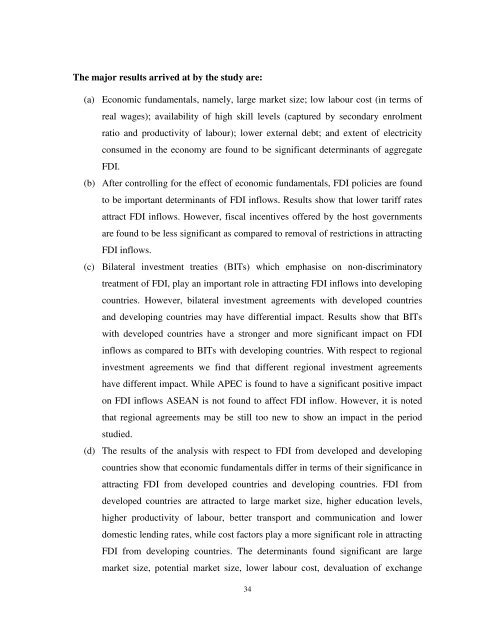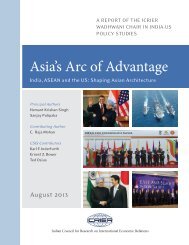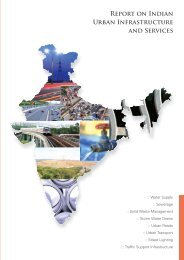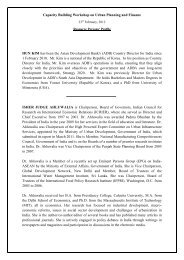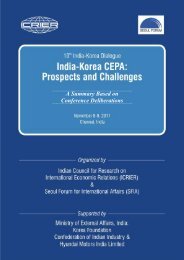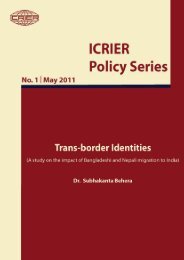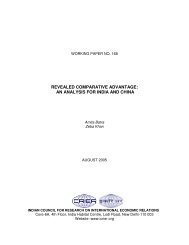impact of government policies and investment agreements on fdi ...
impact of government policies and investment agreements on fdi ...
impact of government policies and investment agreements on fdi ...
You also want an ePaper? Increase the reach of your titles
YUMPU automatically turns print PDFs into web optimized ePapers that Google loves.
The major results arrived at by the study are:<br />
(a) Ec<strong>on</strong>omic fundamentals, namely, large market size; low labour cost (in terms <str<strong>on</strong>g>of</str<strong>on</strong>g><br />
real wages); availability <str<strong>on</strong>g>of</str<strong>on</strong>g> high skill levels (captured by sec<strong>on</strong>dary enrolment<br />
ratio <str<strong>on</strong>g>and</str<strong>on</strong>g> productivity <str<strong>on</strong>g>of</str<strong>on</strong>g> labour); lower external debt; <str<strong>on</strong>g>and</str<strong>on</strong>g> extent <str<strong>on</strong>g>of</str<strong>on</strong>g> electricity<br />
c<strong>on</strong>sumed in the ec<strong>on</strong>omy are found to be significant determinants <str<strong>on</strong>g>of</str<strong>on</strong>g> aggregate<br />
FDI.<br />
(b) After c<strong>on</strong>trolling for the effect <str<strong>on</strong>g>of</str<strong>on</strong>g> ec<strong>on</strong>omic fundamentals, FDI <str<strong>on</strong>g>policies</str<strong>on</strong>g> are found<br />
to be important determinants <str<strong>on</strong>g>of</str<strong>on</strong>g> FDI inflows. Results show that lower tariff rates<br />
attract FDI inflows. However, fiscal incentives <str<strong>on</strong>g>of</str<strong>on</strong>g>fered by the host <str<strong>on</strong>g>government</str<strong>on</strong>g>s<br />
are found to be less significant as compared to removal <str<strong>on</strong>g>of</str<strong>on</strong>g> restricti<strong>on</strong>s in attracting<br />
FDI inflows.<br />
(c) Bilateral <str<strong>on</strong>g>investment</str<strong>on</strong>g> treaties (BITs) which emphasise <strong>on</strong> n<strong>on</strong>-discriminatory<br />
treatment <str<strong>on</strong>g>of</str<strong>on</strong>g> FDI, play an important role in attracting FDI inflows into developing<br />
countries. However, bilateral <str<strong>on</strong>g>investment</str<strong>on</strong>g> <str<strong>on</strong>g>agreements</str<strong>on</strong>g> with developed countries<br />
<str<strong>on</strong>g>and</str<strong>on</strong>g> developing countries may have differential <str<strong>on</strong>g>impact</str<strong>on</strong>g>. Results show that BITs<br />
with developed countries have a str<strong>on</strong>ger <str<strong>on</strong>g>and</str<strong>on</strong>g> more significant <str<strong>on</strong>g>impact</str<strong>on</strong>g> <strong>on</strong> FDI<br />
inflows as compared to BITs with developing countries. With respect to regi<strong>on</strong>al<br />
<str<strong>on</strong>g>investment</str<strong>on</strong>g> <str<strong>on</strong>g>agreements</str<strong>on</strong>g> we find that different regi<strong>on</strong>al <str<strong>on</strong>g>investment</str<strong>on</strong>g> <str<strong>on</strong>g>agreements</str<strong>on</strong>g><br />
have different <str<strong>on</strong>g>impact</str<strong>on</strong>g>. While APEC is found to have a significant positive <str<strong>on</strong>g>impact</str<strong>on</strong>g><br />
<strong>on</strong> FDI inflows ASEAN is not found to affect FDI inflow. However, it is noted<br />
that regi<strong>on</strong>al <str<strong>on</strong>g>agreements</str<strong>on</strong>g> may be still too new to show an <str<strong>on</strong>g>impact</str<strong>on</strong>g> in the period<br />
studied.<br />
(d) The results <str<strong>on</strong>g>of</str<strong>on</strong>g> the analysis with respect to FDI from developed <str<strong>on</strong>g>and</str<strong>on</strong>g> developing<br />
countries show that ec<strong>on</strong>omic fundamentals differ in terms <str<strong>on</strong>g>of</str<strong>on</strong>g> their significance in<br />
attracting FDI from developed countries <str<strong>on</strong>g>and</str<strong>on</strong>g> developing countries. FDI from<br />
developed countries are attracted to large market size, higher educati<strong>on</strong> levels,<br />
higher productivity <str<strong>on</strong>g>of</str<strong>on</strong>g> labour, better transport <str<strong>on</strong>g>and</str<strong>on</strong>g> communicati<strong>on</strong> <str<strong>on</strong>g>and</str<strong>on</strong>g> lower<br />
domestic lending rates, while cost factors play a more significant role in attracting<br />
FDI from developing countries. The determinants found significant are large<br />
market size, potential market size, lower labour cost, devaluati<strong>on</strong> <str<strong>on</strong>g>of</str<strong>on</strong>g> exchange<br />
34


